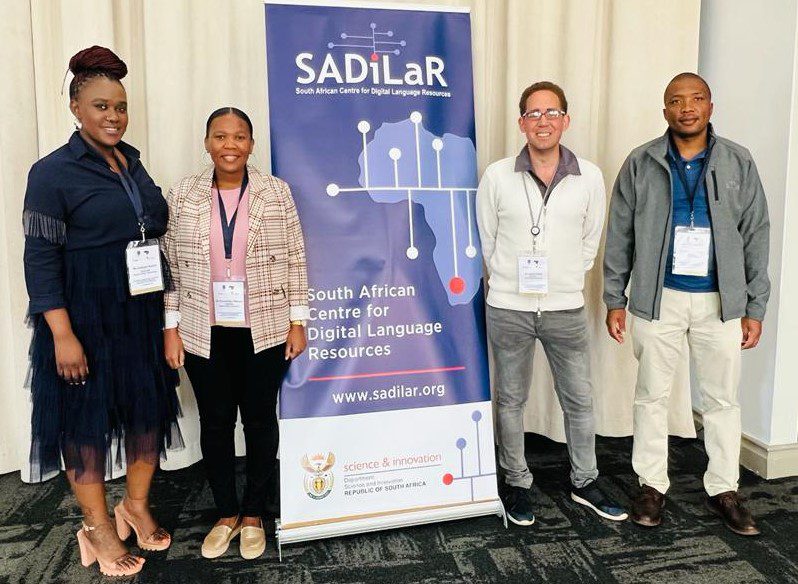Last month four SADiLaR researchers attended the 23rd Biennial International Conference of the African Languages Association of Southern Africa, organised by the African Language Association of Southern Africa (ALASA) in collaboration with the Pan South African Language Board, the Department of African Language Studies and the Centre for Advanced Studies of African Society of the University of the Western Cape’s (UWC) Faculty of Arts and Humanities. The conference, themed African languages in practice in the 21st century, took place in Stellenbosch from 21 to 24 September 2022.
Image caption: Four SADiLaR researchers attending the ALASA 2022 conference. From left to right: Andiswa Bukula, Rooweither Mabuya, Benito Trollip, Muzi Matfunjwa

Raising awareness of the SADiLaR’s contribution to the field
Rooweither Mabuya, Andiswa Bukula,Muzi Matfunjwa and Benito Trollip from SADiLaR all attended and presented papers, but, say the four researchers, the value of SADiLaR staff attending conferences goes far beyond presenting research.
“These conferences give us a great opportunity to speak to researchers in the field about what SADiLaR, as a national research infrastructure, does, and what we can do for them,” says Bukula, digital humanities (DH) researcher in isiXhosa. “Researchers are very interested in finding out about our open call for funding, how they can access our repository and what possibilities and support is available for researchers interested in enhancing their research using computational tools.”
Matfunjwa, presented on The efficacy of Siswati part of speech tagger, assessing the efficacy of the part of speech tagger for Siswati, problems observed from incorrectly tagged words and possible solutions to improve the accuracy of the tagger. He noted the interest from other researchers in how he used digital tools in his analysis of Siswati, the language he specialises in as a DH researcher.
“Meeting in person at a conference, and hearing researchers present is a great opportunity to show our relevance to researchers in the field,” says Trollip, who specialises in Afrikaans. “The ALASA conference, for instance, had strong presentations in forensic linguistics, and I met a research fellow from UWC who wants to build a corpus of specific court judgments. I found this out by listening to her presentation, and we connected thereafter as SADiLaR has the expertise to assist her with this.”
Celebrating South Africa’s indigenous languages
For all four researchers who attended the conference the highlight was the presentations given by researchers about their languages, in their languages, with no interpretation services.
“For me, this was mind blowing,” says Mabuya, whose research speciality is isiZulu., “Through this the ALASA conference made a very clear and powerful statement advocating for the upliftment and development of our indigenous languages.”
Trollip, who attended several presentations in South African languages he does not speak, agrees: “It is just wonderful watching people express themselves in their own languages. As an Afrikaans researcher and mother tongue speaker I purposely target Afrikaans conferences for the joy of being able to present in my own tongue. It is wonderful to see this practice taking off with our indigenous languages.”
Bukula says she also really appreciated the diversity of both the speakers and the presentations, and the high quality of presentations in general.
“Presentations ranged from those on literature and poetry to forensic linguistics to the more technical and computational work. It was great listening to presentations in our different languages and the social events were excellent,” she says.
“Congratulations to the organisers for an excellent and well-organised conference.”
